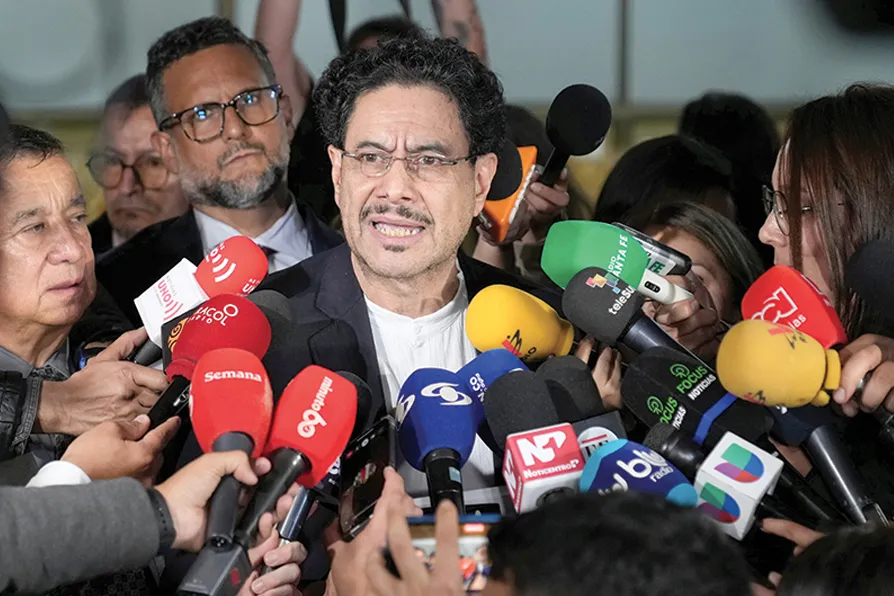This weekend, the NEU holds a special conference to debate changing its approach to organising teaching assistants, which a 2017 TUC agreement forbids. General secretary DANIEL KEBEDE outlines the choices before delegates
Alvaro Uribe is found guilty of witness tampering and procedural fraud, reports NICK MACWILLIAM

 JUSTICE AT LAST: Senator Ivan Cepeda speaks to journalists outside court in Bogota, Colombia on Monday, July 28 2025, after former president Alvaro Uribe was found guilty of witness tampering and bribery in a case Cepeda brought against him
JUSTICE AT LAST: Senator Ivan Cepeda speaks to journalists outside court in Bogota, Colombia on Monday, July 28 2025, after former president Alvaro Uribe was found guilty of witness tampering and bribery in a case Cepeda brought against him
ALVARO URIBE has been found guilty of witness tampering and procedural fraud in a case which has thrust his alleged links to paramilitary groups into the spotlight and could land Uribe in prison.
On Monday July 28, Judge Sandra Liliana Heredia ruled that Uribe had attempted to bribe imprisoned paramilitaries to incriminate the left-wing Senator Ivan Cepeda, a long-time Uribe critic and spokesperson for the Movement of Victims of State Crimes of Colombia.
In 2014, before the Supreme Court, Uribe accused Cepeda of fraud and of falsely claiming Uribe had colluded with paramilitary groups that were behind massacres, forced displacements and other serious human rights violations.
However, in 2018, the same court found that Cepeda had no case to answer, while at the same time launching an investigation into Uribe on suspicion of coercing former paramilitaries to provide false testimony against Cepeda.
This prompted Uribe to renounce his Senate seat in 2020 in a move calculated to transfer jurisdiction of his case to the then attorney general Francisco Barbosa, an Uribe ally.
The Bogota court’s verdict effectively finds that Cepeda’s allegations against the former president were valid, and that Uribe broke the law seeking to protect himself.
While an appeal is set for October, Uribe could face a 12-year prison sentence if the ruling is upheld. Although the court absolved Uribe of having attempted to bribe a lawyer, Hilda Nino, to provide favourable testimony about him, it also found that claims by a number of former paramilitaries against Cepeda were not credible.
According to witness Juan Guillermo Monsalve, whose father worked on the Uribe family ranch in Antioquia in the 1990s, the former president and his brother Santiago had participated in the creation of a paramilitary group, the Bloque Metro.
In 2018, Uribe’s lawyer, Diego Cadena, offered benefits to Monsalve if he withdrew his testimony. Unknown to Cadena, Monsalve recorded the meeting and provided the evidence to authorities.
Monsalve later received a similar offer from another associate, Carlos Lopez. Former paramilitary Carlos Enrique Velez also testified that Cadena offered him money to speak positively about Uribe.
Cadena is currently on trial accused of bribery and fraud. Uribe has claimed he was unaware of his lawyer’s attempts to manipulate witnesses, but the judge rejected this stating that, “there is no doubt that the accused knew his actions were illegal.”
Meanwhile, in November 2024, Santiago Uribe was acquitted of belonging to a paramilitary group, the 12 Apostles, which in the 1990s and 2000s operated in Antioquia and targeted people they accused of guerilla sympathies which included many social activists, as well as those considered “social undesirables” such as homeless people, sex workers and addicts.
The long-running investigation into Alvaro Uribe has polarised public opinion. As founder of the hard-right Democratic Centre political party, he retains a hardcore following among right-wing voters — known as uribistas — who revere his hard-line and militaristic presidency (2002-10), for allegedly having prevented a guerilla takeover of the country.
It was Uribe who led opposition to the peace process with the Farc, culminating in the No vote against the agreement in a 2016 national plebiscite. However, in November 2016 a final peace deal was signed between the Farc and the Colombian government under the initiative of the then president Juan Manuel Santos Calderon (2010-18) for which he received the Nobel Peace Prize.
Following the 2016 Peace Agreement Colombia’s transitional justice court, the Special Jurisdiction for Peace, found that during Uribe’s presidency the military murdered 6,402 innocent people and presented them as guerillas killed in combat.
Today for many Colombians Uribe’s presidency is now synonymous with state atrocities against civilians and neoliberal policies that pushed millions of people into poverty.
The verdict is a further political blow for the Colombian far right, which is why its international allies are mobilising to attack the judges.
Uribe has long been suspected of colluding with paramilitary groups while governor of Antioquia in the 1990s. Often working alongside the army, landowners and corporations, these groups used extreme violence to target trade unionists, peasants, community leaders and other civilians. Millions of people were driven from their homes by military and paramilitary violence.
Uribe’s legal team has said it will appeal the ruling in another court, the Bogota Superior Tribunal. If that court upholds the verdict, a further appeal is likely.
However, for the countless victims of state abuses and paramilitary violence in the 2000s, there is hope that justice will finally catch up with the former president.
This article first appeared on the Justice for Colombia website justiceforcolombia.org.

Far-right forces are rising across Latin America and the Caribbean, armed with a common agenda of anti-communism, the culture war, and neoliberal economics, writes VIJAY PRASHAD

With Petro, Colombia has been making huge strides towards peace — but is all that at risk with the elections next year? MARK ROWE reports back after joining a delegation to the Latin American country

Colombia’s success in controlling the drug trade should be recognised and its sovereignty respected, argues Dr GLORY SAAVEDRA

MOLLY QUELL reports on the sanctions placed on International Criminal Court officials by the Trump regime, making it increasingly difficult for the tribunal to conduct even basic tasks










